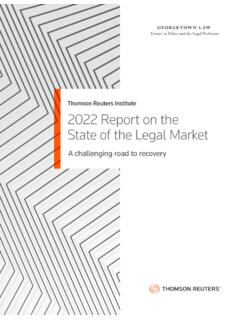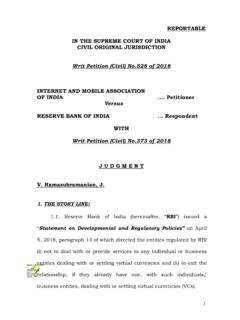Transcription of Compendium – Cryptocurrency regulations by country
1 20 Compendium Cryptocurrency regulations by country Cryptocurrency regulations by countryJune 1, 2021By Todd Ehret and Susannah Hammond, Regulatory IntelligenceThe public appetite and enthusiasm for cryptocurrencies such as bitcoin have exploded in recent years. First introduced in 2008 as an alternative and disruptive technology to traditional banking and payments, bitcoin and other digital currencies or digital assets were met with skepticism and caution as they were not understood. Their anonymity also made cryptocurrencies susceptible to misuse in illicit activities. Much has changed in recent years, as the number of users has exploded, and some established financial services firms have also begun to test the crypto waters. Prices have rocketed despite incredible volatility, and financial regulators and regulations have struggled to keep regulatory regime surrounding cryptocurrencies is fragmented and stretches to the extremes of outright bans in some jurisdictions, to some countries that are advocates.
2 Complete restrictions are somewhat rare and difficult to enforce, with crypto markets regularly shrugging off news of restrictions in some jurisdictions, but regulators are scrambling to clarify rules and keep pace with crypto s exploding regulatory overlay related to digital assets such as bitcoin and other cryptocurrencies in its infancy, and the challenge of building a regulatory framework often is complex and uncertain. Many market participants insist on a more established regulatory regime and certainty, which likely means new rules, regulations , or at a minimum official guidance. The race to create such a regulatory regime is now , cryptocurrencies , central bank digital currencies and non-fungible tokens make up the new crypto universe, and each provides unique benefits, challenges, and complexities.
3 This annex provides a country -by- country summary of the Cryptocurrency regulatory picture. The list below focuses on cryptocurrencies such as bitcoin. It provides an overview for each country , the regulatory state of play and links to the primary financial regulatory authorities or relevant documents. Much of the regulatory framework is still developing, and regulations and restrictions also vary greatly depending on uses such as payments, investments, derivatives, and tax status. Most countries have generally found ways to tax gains or income derived from cryptocurrencies , and some have more specific obligations than others. Few pure tax havens Intelligence may delve deeper into other aspects of cryptos such as non-fungible tokens and digital central bank currencies in future articles or special on the riseNorth AmericaCanada Canada has been an early adopter and is seen as quite crypto -friendly with several approvals of bitcoin exchange-traded funds (ETFs).
4 Canadian Securities Administrators (CSA) and the Investment Industry Regulatory Organization of Canada (IIROC) have issued guidance requiring crypto trading platforms and dealers in Canada to register with the local provincial regulators. Firms dealing with cryptos are considered money service businesses (MSBs) and must also register with the Financial Transactions and Reports Analysis Centre of Canada (FINTRAC). The requirements also apply to foreign-based firms if they have Canadian customers. The Canada Revenue Authority (CRA) generally treats Cryptocurrency like a commodity for purposes of the Income Tax Mexico has embraced cryptocurrencies and is seen as a very crypto -friendly jurisdiction. The Mexican government and the financial authority, CNBV enacted a new set of fintech laws in March 2018.
5 Its largest crypto exchange, Bitsos, has more than 1 million users on its s Federal AML Law was amended in March 2018 to include transactions with virtual assets .Mexico s tax framework for cryptocurrencies is expected to change as there is no official position. Most see cryptos as intangible assets where gains would be taxed at 30% for corporations and anywhere from 2% to 35% for States The regulatory framework for cryptocurrencies is evolving despite overlap and differences in viewpoints between agencies. Although the Securities and Exchange Commission is widely seen as the most powerful regulator, Treasury s FinCEN, the Federal Reserve Board, and the CFTC have issued their own differing interpretations and guidance. The SEC often views cryptos as securities, the CFTC calls bitcoin a commodity, and Treasury calls it a currency.
6 The Internal Revenue Service (IRS) defines cryptocurrencies as a digital representation of value that functions as a medium of exchange, a unit of account, and/or a store of value and has issued tax guidance the muddied regulatory framework, the United States is seen as home to the largest number of crypto investors, exchanges, trading platforms, crypto mining firms and investment and South AmericaArgentina In Argentina, investing in cryptocurrencies is legal but they are not considered legal currency or tender as they are not issued by the government. Although there are no regulations , profits are taxable. Legislation has been proposed to create a national legal and regulatory framework for crypto -assets as a means of payments, investments, and Argentina Securities and Exchange Commission (CNV) will be the regulatory body with oversight responsibilities and plans to maintain a national registry of operations with transactions reported to the Financial Information Unit (FIU) for compliance with anti-money laundering s Federal Administration of Public Income (AFIP) and central bank have requested more information from domestic crypto exchanges and banks.
7 Gains from cryptos are generally taxable at a 4% to rate on gross income for each digital currency The Bolivian government banned the use of cryptocurrencies such as bitcoin in 2014, in the belief that it would facilitate tax evasion and monetary instability. It is illegal to use any kind of currency that is not issued and controlled by a government or an authorized entity, Bolivia s central bank (BCB) said. Brazil cryptocurrencies in Brazil are largely unregulated. Legislators have, however, begun to propose a series of regulations that might fill the void if enacted. The Brazilian Securities and Exchange Commission, or CVM has approved two crypto ETFs. The Brazilian government has declared that bitcoin is an asset and therefore is subject to capital gains taxes.
8 Brazil has said that existing AML laws extend to virtual currencies in a few Special Department of Federal Revenue of Brazil has published a document on Cryptocurrency taxes in the The Chilean government has committed to develop a regulatory and oversight framework for cryptocurrencies and the growing number of Cryptocurrency exchanges in the country . In the absence of a legal framework, the Central Bank and the Financial Market Commission has said that existing regulations are applicable to cryptocurrencies . The Chilean Internal Revenue Service (SII) is the only institution so far to have issued legislation on cryptocurrencies in Notice no 963, issued on May 14, 2018. The SII released a determination on the taxation of income obtained from buying and selling cryptocurrencies .
9 It said that Tax Form 22 would require the declaration from the sale of foreign currencies of legal course or assets digital/virtual, such as cryptocurrencies (for example, bitcoins) . Colombia In Colombia there is no specific legislation regulating the use of cryptocurrencies . The Banco de la Rep blica, the country s monetary, exchange and credit authority, and the Superintendencia Financiera de Colombia (SFC), the government agency responsible for overseeing financial regulation and market systems, released statements on cryptos warning they are not legal tender or valid investments for supervised entities, and firms are not authorized to advise or manage Superintendency of Corporations in Colombia has stated that companies can legally purchase cryptos such as bitcoin, however such intangible assets are unregulated.
10 The country s tax authority, Directorate of National Taxes and Customs (DIAN) said virtual currencies are not money for legal purposes. However, in the context of mining activity, insofar as they are received in exchange for services and/or commissions, they correspond to income and, in any case, to goods that can be valued and generate income for those who obtain them as from be part of your patrimony and take effect in tax matters. The SFC has authorized the creation of a sandbox test environment for supervised firms and crypto -asset exchange platforms to test the handling of In January 2018 the Central Bank of Ecuador informed citizens that bitcoin is not a means of payment authorized for use in the country . Financial transactions are not controlled, supervised, or regulated by any entity in the country , and this presents a financial risk to those who use this warning, the Central Bank has said that the purchase and sale of cryptocurrencies - such as bitcoin - through the internet is not prohibited.







